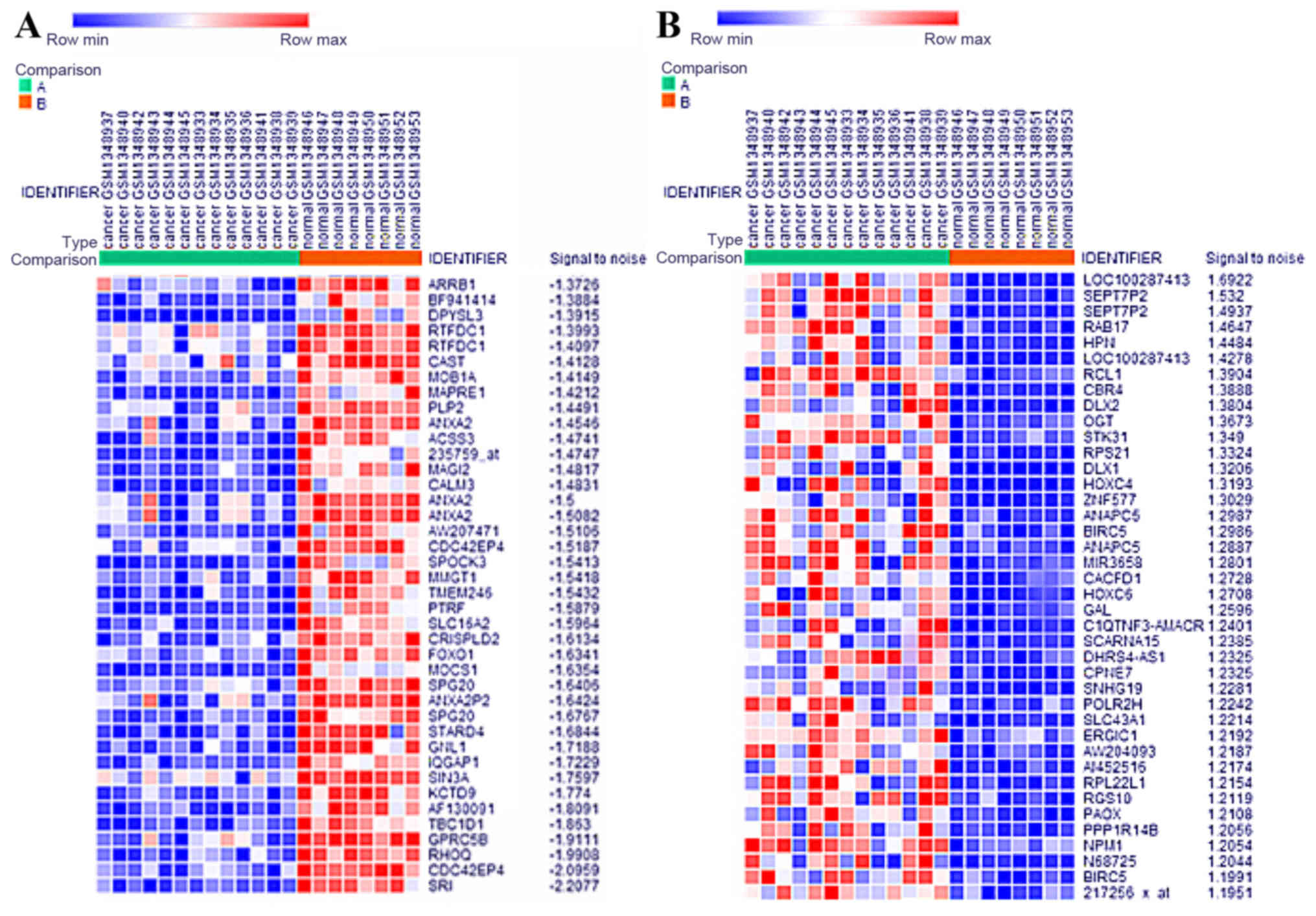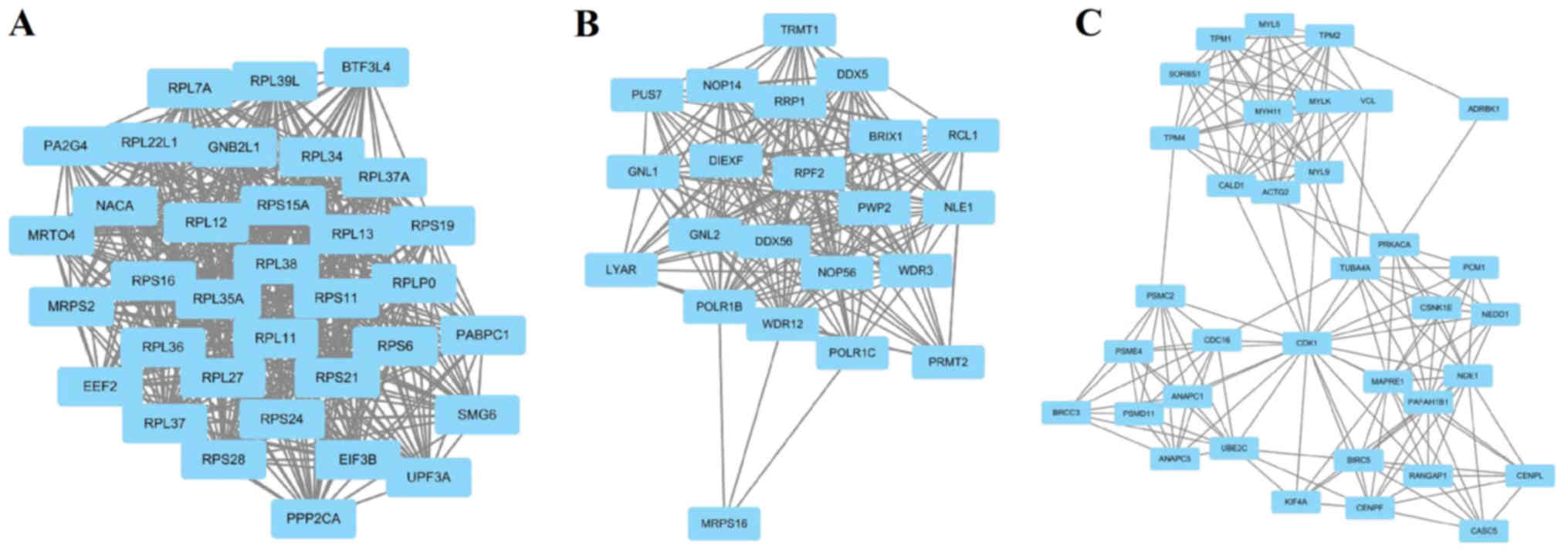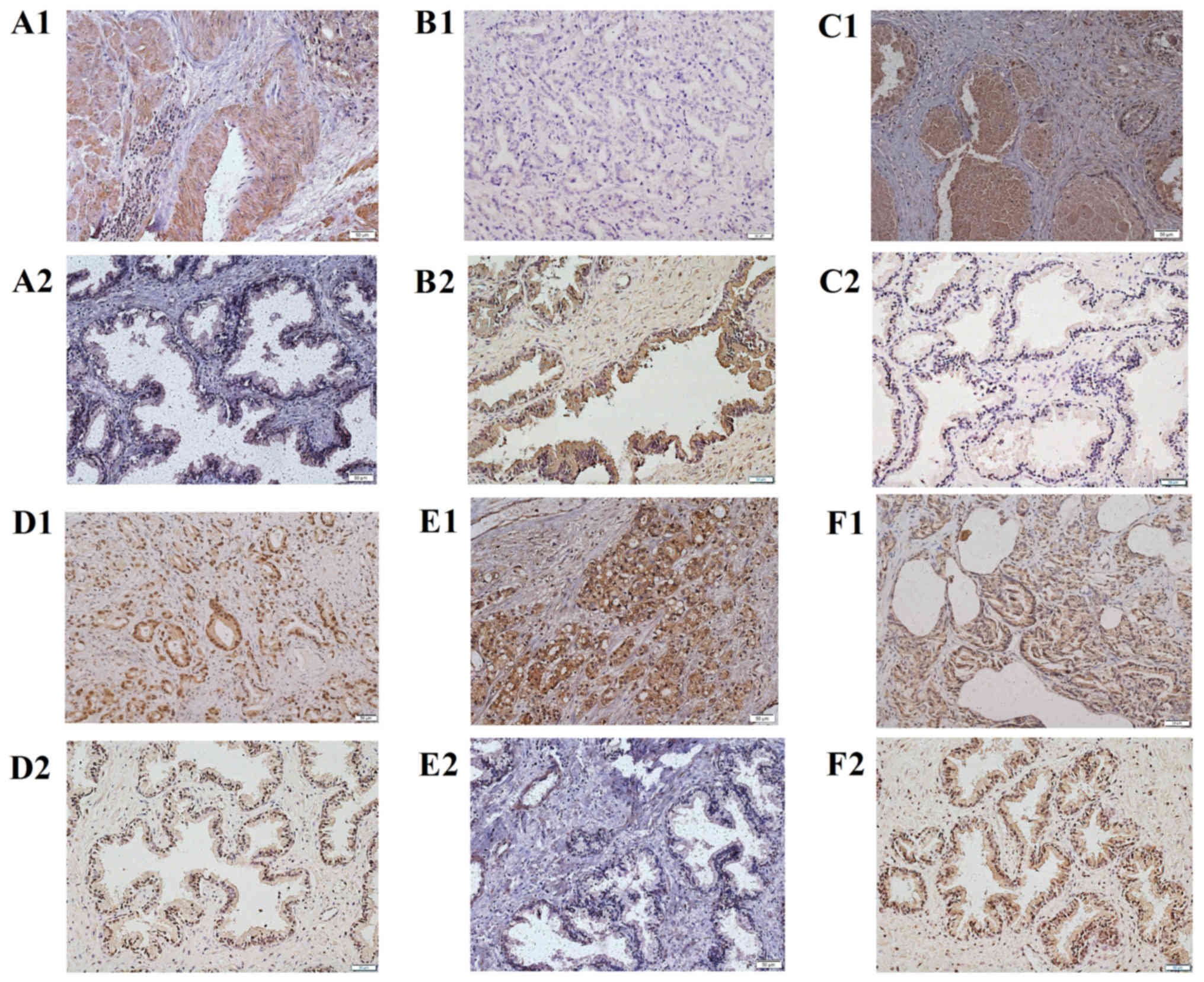|
1
|
Djulbegovic M, Beyth RJ, Neuberger MM,
Stoffs TL, Vieweg J, Djulbegovic B and Dahm P: Screening for
prostate cancer: Systematic review and meta-analysis of randomised
controlled trials. BMJ. 341:c45432010. View Article : Google Scholar : PubMed/NCBI
|
|
2
|
Liu L, Guo K, Liang Z, Li F and Wang H:
Identification of candidate genes that may contribute to the
metastasis of prostate cancer by bioinformatics analysis. Oncol
Lett. 15:1220–1228. 2018.PubMed/NCBI
|
|
3
|
Abate-Shen C and Shen MM: Molecular
genetics of prostate cancer. Genes Dev. 14:2410–2434. 2000.
View Article : Google Scholar : PubMed/NCBI
|
|
4
|
Cancer genome atlas research network: The
molecular taxonomy of primary prostate cancer. Cell. 163:1011–1025.
2015. View Article : Google Scholar : PubMed/NCBI
|
|
5
|
Hafeez BB, Zhong W, Fischer JW, Mustafa A,
Shi X, Meske L, Hong H, Cai W, Havighurst T, Kim K and Verma AK:
Plumbagin, a medicinal plant (Plumbago zeylanica)-derived
1,4-naphthoquinone, inhibits growth and metastasis of human
prostate cancer PC-3M-luciferase cells in an orthotopic xenograft
mouse model. Mol Oncol. 7:428–439. 2013. View Article : Google Scholar : PubMed/NCBI
|
|
6
|
Nannini M, Pantaleo MA, Maleddu A, Astolfi
A, Formica S and Biasco G: Gene expression profiling in colorectal
cancer using microarray technologies: Results and perspectives.
Cancer Treat Rev. 35:201–209. 2009. View Article : Google Scholar : PubMed/NCBI
|
|
7
|
Liang B, Li C and Zhao J: Identification
of key pathways and genes in colorectal cancer using bioinformatics
analysis. Med Oncol. 33:1112016. View Article : Google Scholar : PubMed/NCBI
|
|
8
|
Arredouani MS, Lu B, Bhasin M, Eljanne M,
Yue W, Mosquera JM, Bubley GJ, Li V, Rubin MA, Libermann TA and
Sanda MG: Identification of the transcription factor single-minded
homologue 2 as a potential biomarker and immunotherapy target in
prostate cancer. Clin Cancer Res. 15:5794–5802. 2009. View Article : Google Scholar : PubMed/NCBI
|
|
9
|
Marín-Aguilera M, Codony-Servat J, Kalko
SG, Fernández PL, Bermudo R, Buxo E, Ribal MJ, Gascón P and Mellado
B: Identification of docetaxel resistance genes in
castration-resistant prostate cancer. Mol Cancer Ther. 11:329–339.
2012. View Article : Google Scholar : PubMed/NCBI
|
|
10
|
Lascorz J, Hemminki K and Försti A:
Systematic enrichment analysis of gene expression profiling studies
identifies consensus pathways implicated in colorectal cancer
development. J Carcinog. 10:72011. View Article : Google Scholar : PubMed/NCBI
|
|
11
|
Mi B, Liu G, Zhou W, Lv H, Liu Y and Liu
J: Identification of genes and pathways in the synovia of women
with osteoarthritis by bioinformatics analysis. Mol Med Rep.
17:4467–4473. 2018.PubMed/NCBI
|
|
12
|
Feng W, Zhou D, Meng W, Li G, Zhuang P,
Pan Z, Wang G and Cheng Z: Growth retardation induced by avian
leukosis virus subgroup J associated with down-regulated
Wnt/β-catenin pathway. Microb Pathog. 104:48–55. 2017. View Article : Google Scholar : PubMed/NCBI
|
|
13
|
Wang W, Zhang J, Zhan X, Lin T, Yang M, Hu
J, Han B and Hu S: SOX4 is associated with poor prognosis in
cholangiocarcinoma. Biochem Biophys Res Commun. 452:614–621. 2014.
View Article : Google Scholar : PubMed/NCBI
|
|
14
|
Yu FX, Zhao B and Guan KL: Hippo pathway
in organ size control, tissue homeostasis, and cancer. Cell.
163:811–828. 2015. View Article : Google Scholar : PubMed/NCBI
|
|
15
|
Theocharis AD and Karamanos NK:
Proteoglycans remodeling in cancer: Underlying molecular
mechanisms. Matrix Biol pii: S0945-053X. 30313-X:2017.
|
|
16
|
Bibens-Laulan N and St-Pierre Y:
Intracellular galectin-7 expression in cancer cells results from an
autocrine transcriptional mechanism and endocytosis of
extracellular galectin-7. PLoS One. 12:e01871942017. View Article : Google Scholar : PubMed/NCBI
|
|
17
|
Kanteti R, Mirzapoiazova T, Riehm JJ,
Dhanasingh I, Mambetsariev B, Wang J, Kulkarni P, Kaushik G,
Seshacharyulu P, Ponnusamy MP, et al: Focal adhesion kinase a
potential therapeutic target for pancreatic cancer and malignant
pleural mesothelioma. Cancer Biol Ther. 19:316–327. 2018.
View Article : Google Scholar : PubMed/NCBI
|
|
18
|
Wang W, Nag S, Zhang X, Wang MH, Wang H,
Zhou J and Zhang R: Ribosomal proteins and human diseases:
Pathogenesis, molecular mechanisms, and therapeutic implications.
Med Res Rev. 35:225–285. 2015. View Article : Google Scholar : PubMed/NCBI
|
|
19
|
Arthurs C, Murtaza BN, Thomson C, Dickens
K, Henrique R, Patel HRH, Beltran M, Millar M, Thrasivoulou C and
Ahmed A: Expression of ribosomal proteins in normal and cancerous
human prostate tissue. PLoS One. 12:e01860472017. View Article : Google Scholar : PubMed/NCBI
|
|
20
|
Huang CJ, Yang SH, Lee CL, Cheng YC, Tai
SY and Chien CC: Ribosomal protein S27-like in colorectal cancer: A
candidate for predicting prognoses. PLoS One. 8:e670432013.
View Article : Google Scholar : PubMed/NCBI
|
|
21
|
Li C, Ge M, Yin Y, Luo M and Chen D:
Silencing expression of ribosomal protein L26 and L29 by RNA
interfering inhibits proliferation of human pancreatic cancer
PANC-1 cells. Mol Cell Biochem. 370:127–139. 2012. View Article : Google Scholar : PubMed/NCBI
|
|
22
|
Duan X, Kong Z, Liu Y, Zeng Z, Li S, Wu W,
Ji W, Yang B, Zhao Z and Zeng G: β-arrestin2 contributes to cell
viability and proliferation via the down-regulation of FOXO1 in
castration-resistant prostate cancer. J Cell Physiol.
230:2371–2381. 2015. View Article : Google Scholar : PubMed/NCBI
|
|
23
|
Dong XY, Chen C, Sun X, Guo P, Vessella
RL, Wang RX, Chung LW, Zhou W and Dong JT: FOXO1A is a candidate
for the 13q14 tumor suppressor gene inhibiting androgen receptor
signaling in prostate cancer. Cancer Res. 66:6998–7006. 2006.
View Article : Google Scholar : PubMed/NCBI
|
|
24
|
Yu JJ, Wu YX, Zhao FJ and Xia SJ: miR-96
promotes cell proliferation and clonogenicity by down-regulating of
FOXO1 in prostate cancer cells. Med Oncol. 31:9102014. View Article : Google Scholar : PubMed/NCBI
|
|
25
|
Fu Z and Tindall DJ: FOXOs, cancer and
regulation of apoptosis. Oncogene. 27:2312–2319. 2008. View Article : Google Scholar : PubMed/NCBI
|
|
26
|
Altieri DC: Survivin, cancer networks and
pathway-directed drug discovery. Nat Rev Cancer. 8:61–70. 2008.
View Article : Google Scholar : PubMed/NCBI
|
|
27
|
Wang H, Zhang X, Wang L, Zheng G, Du L,
Yang Y, Dong Z, Liu Y, Qu A and Wang C: Investigation of cell free
BIRC5 mRNA as a serum diagnostic and prognostic biomarker for
colorectal cancer. J Surg Oncol. 109:574–579. 2014. View Article : Google Scholar : PubMed/NCBI
|
|
28
|
Vitale I, Galluzzi L, Senovilla L, Criollo
A, Jemaà M, Castedo M and Kroemer G: Illicit survival of cancer
cells during polyploidization and depolyploidization. Cell Death
Differ. 18:1403–1413. 2011. View Article : Google Scholar : PubMed/NCBI
|
|
29
|
Kwon M, Godinho SA, Chandhok NS, Ganem NJ,
Azioune A, Thery M and Pellman D: Mechanisms to suppress multipolar
divisions in cancer cells with extra centrosomes. Genes Dev.
22:2189–2203. 2008. View Article : Google Scholar : PubMed/NCBI
|
|
30
|
Du YJ, Hou YL and Hou WR: Molecular
characterization of a gene POLR2H encoded an essential subunit for
RNA polymerase II from the Giant Panda (Ailuropoda Melanoleuca).
Mol Biol Rep. 40:1495–1498. 2013. View Article : Google Scholar : PubMed/NCBI
|
|
31
|
Sugihara Y, Honda H, Iida T, Morinaga T,
Hino S, Okajima T, Matsuda T and Nadano D: Proteomic analysis of
rodent ribosomes revealed heterogeneity including ribosomal
proteins L10-like, L22-like 1, and L39-like. J Proteome Res.
9:1351–1366. 2010. View Article : Google Scholar : PubMed/NCBI
|
|
32
|
O'Leary MN, Schreiber KH, Zhang Y, Duc AC,
Rao S, Hale JS, Academia EC, Shah SR, Morton JF, Holstein CA, et
al: The ribosomal protein Rpl22 controls ribosome composition by
directly repressing expression of its own paralog, Rpl22l1. PLoS
Genet. 9:e10037082013. View Article : Google Scholar : PubMed/NCBI
|
|
33
|
Wu N, Wei J, Wang Y, Yan J, Qin Y, Tong D,
Pang B, Sun D, Sun H, Yu Y, et al: Ribosomal L22-like1 (RPL22L1)
promotes ovarian cancer metastasis by inducing
epithelial-to-mesenchymal transition. PLoS One. 10:e01436592015.
View Article : Google Scholar : PubMed/NCBI
|
|
34
|
Zhang Y, Duc AC, Rao S, Sun XL, Bilbee AN,
Rhodes M, Li Q, Kappes DJ, Rhodes J and Wiest DL: Control of
hematopoietic stem cell emergence by antagonistic functions of
ribosomal protein paralogs. Dev Cell. 24:411–425. 2013. View Article : Google Scholar : PubMed/NCBI
|
|
35
|
Loubeau G, Boudra R, Maquaire S,
Lours-Calet C, Beaudoin C, Verrelle P and Morel L: NPM1 silencing
reduces tumour growth and MAPK signalling in prostate cancer cells.
PLoS One. 9:e962932014. View Article : Google Scholar : PubMed/NCBI
|
|
36
|
Léotoing L, Meunier L, Manin M, Mauduit C,
Decaussin M, Verrijdt G, Claessens F, Benahmed M, Veyssière G,
Morel L and Beaudoin C: Influence of nucleophosmin/B23 on DNA
binding and transcriptional activity of the androgen receptor in
prostate cancer cell. Oncogene. 27:2858–2867. 2008. View Article : Google Scholar : PubMed/NCBI
|
|
37
|
Dai L, Li J, Xing M, Sanchez TW, Casiano
CA and Zhang JY: Using serological proteome analysis to identify
serum anti-nucleophosmin 1 autoantibody as a potential biomarker in
european-american and african-american patients with prostate
cancer. Prostate. 76:1375–1386. 2016. View Article : Google Scholar : PubMed/NCBI
|
|
38
|
Yun SJ, Moon SK and Kim WJ:
Investigational cell cycle inhibitors in clinical trials for
bladder cancer. Expert Opin Investig Drugs. 22:369–377. 2013.
View Article : Google Scholar : PubMed/NCBI
|
|
39
|
Zhao Z, Liu J, Wang C, Wang Y, Jiang Y and
Guo M: MicroRNA-25 regulates small cell lung cancer cell
development and cell cycle through cyclin E2. Int J Clin Exp
Pathol. 7:7726–7734. 2014.PubMed/NCBI
|
|
40
|
Soták M, Sumová A and Pácha J: Cross-talk
between the circadian clock and the cell cycle in cancer. Ann Med.
46:221–232. 2014. View Article : Google Scholar : PubMed/NCBI
|
|
41
|
Gentilella A, Kozma SC and Thomas G: A
liaison between mTOR signaling, ribosome biogenesis and cancer.
Biochim Biophys Acta. 1849:812–820. 2015. View Article : Google Scholar : PubMed/NCBI
|
|
42
|
Zhang C, Yin C, Wang L, Zhang S, Qian Y,
Ma J, Zhang Z, Xu Y and Liu S: HSPC111 governs breast cancer growth
by regulating ribosomal biogenesis. Mol Cancer Res. 12:583–594.
2014. View Article : Google Scholar : PubMed/NCBI
|
|
43
|
Brighenti E, Treré D and Derenzini M:
Targeted cancer therapy with ribosome biogenesis inhibitors: A real
possibility? Oncotarget. 6:38617–38627. 2015. View Article : Google Scholar : PubMed/NCBI
|

















